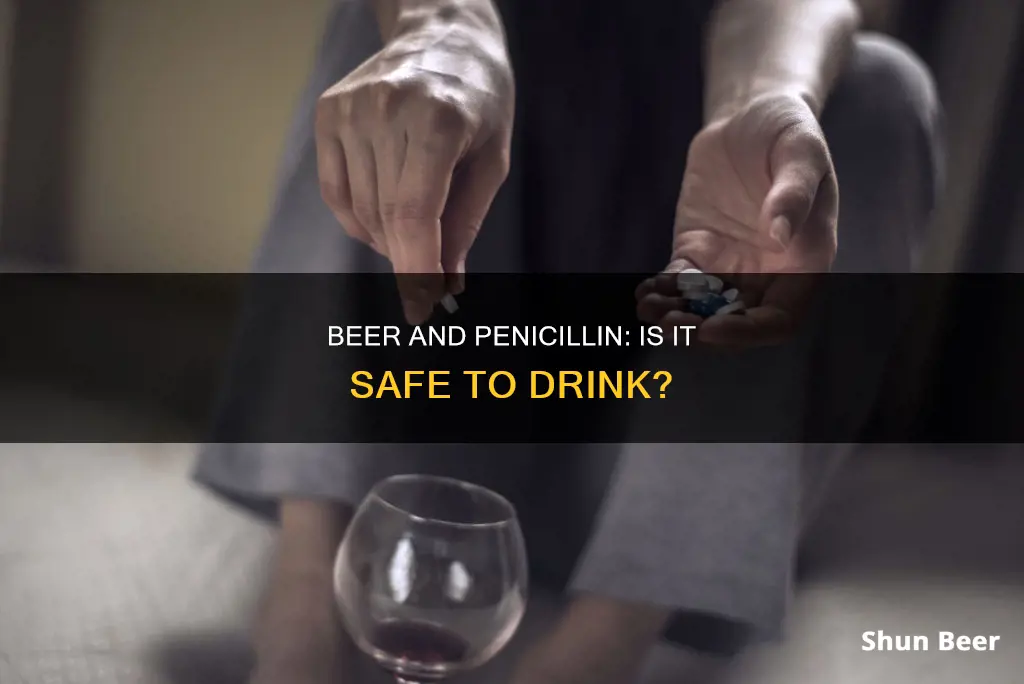
Drinking alcohol while on medication is generally not recommended, as it can cause harmful interactions and side effects. While alcohol doesn't typically affect the effectiveness of most antibiotics, including penicillin, it can increase the risk of adverse side effects. It is always advisable to consult the 'Patient Information Leaflet' that comes with the medication to understand any specific warnings, side effects, and interactions with alcohol.
| Characteristics | Values |
|---|---|
| Alcohol's ability to interact with penicillin | Alcohol does not have the ability to interact with penicillin |
| Side effects | Alcohol may worsen side effects of penicillin, such as nausea and dizziness |
| Recommendation | It is recommended to avoid drinking alcohol while taking penicillin |
What You'll Learn

Alcohol and penicillin side effects
While alcohol does not interact with penicillin, it is important to note that drinking alcohol while taking any medication, including penicillin, may come with certain risks and side effects.
Firstly, alcohol can delay your recovery from illness by reducing your energy levels and interfering with essential processes such as sleep and hydration. Alcohol is also a diuretic, which can cause dehydration, further impacting your recovery. Additionally, alcohol can intensify any sickness symptoms you may be experiencing, such as dizziness or drowsiness.
In general, it is recommended to avoid drinking alcohol while taking any medication, including penicillin, as alcohol can increase the risk of experiencing side effects. While penicillin does not fall under this category, some antibiotics, such as metronidazole and tinidazole, can cause a serious reaction when combined with alcohol. Symptoms of this reaction may include breathlessness, headaches, chest pain, increased or irregular heartbeat, nausea, and vomiting.
It is always a good idea to read the 'Patient Information Leaflet' that comes with your medication, as it will detail any specific warnings, side effects, and interactions with alcohol. Additionally, consulting with your doctor or pharmacist is advisable if you have any concerns or questions about drinking alcohol while taking penicillin or any other medication.
Heart Stents and Beer: Is It Safe?
You may want to see also

Alcohol's impact on the immune system
Drinking alcohol while taking penicillin or other antibiotics is generally not recommended due to the potential for harmful interactions and negative effects on the immune system. While alcohol does not typically interfere with the effectiveness of most common antibiotics, including penicillin, it can increase the risk of experiencing certain side effects.
Alcohol can negatively impact the immune system, hindering the body's ability to recover from an infection. Alcohol can disrupt sleep patterns and increase blood sugar levels, zapping energy levels and interfering with the healing process. Additionally, alcohol can stop the body from absorbing vital nutrients, further impairing the immune system's ability to function optimally. Acute alcohol use, binge drinking, and chronic alcohol consumption can all have detrimental effects on the immune system, regardless of medication use.
Consuming alcohol while taking antibiotics can also lead to a range of unpleasant side effects. These may include nausea, vomiting, facial flushing, headache, breathlessness, chest pain, increased or irregular heartbeat, digestive problems, and seizures. The combination of alcohol and antibiotics can hinder cognitive function, concentration, and coordination.
Furthermore, alcohol can intensify existing symptoms of sickness, such as dizziness or drowsiness, and interfere with essential processes like sleep and hydration, which are critical for recovering from a bacterial illness. The kidneys, responsible for removing toxins from the body, can be overburdened and damaged by the combination of alcohol and antibiotics.
It is worth noting that the negative effects of alcohol on the immune system are not limited to those taking antibiotics. Alcohol consumption can disrupt the body's natural healing processes and increase the risk of developing infections, regardless of medication use. Therefore, it is generally advisable to avoid alcohol consumption when feeling unwell or recovering from an illness.
In summary, while alcohol may not directly interact with penicillin or other common antibiotics, it can have detrimental effects on the immune system and the body's ability to recover from an infection. It is advisable to avoid alcohol consumption while taking antibiotics and to prioritize rest and proper nutrition to support the healing process.
Beer and Citalopram: Safe Mix?
You may want to see also

Antibiotics and alcohol: a dangerous mix?
It is commonly believed that alcohol will stop antibiotics from working properly or cause unpleasant side effects. However, this is not true for most antibiotics. In fact, the majority of commonly prescribed antibiotics are not affected by alcohol.
That being said, there are some exceptions. For example, the antibiotics metronidazole and tinidazole may cause a serious reaction when mixed with alcohol, including breathlessness, headaches, chest pain, increased or irregular heartbeat, and nausea or vomiting. The NHS advises avoiding drinking for 48 hours after you stop taking metronidazole and 72 hours after you stop taking tinidazole.
Another antibiotic that may interact with alcohol is cefotetan, a type of cephalosporin. This antibiotic slows down alcohol breakdown, leading to increased levels of acetaldehyde, which can cause nausea, vomiting, facial flushing, headache, breathlessness, and chest pain.
Other antibiotics that should not be mixed with alcohol include linezolid and doxycycline. Linezolid can interact with undistilled alcoholic drinks such as wine, beer, sherry, and lager. Doxycycline is known to interact with alcohol, and its effectiveness may be reduced in people with a history of chronic alcohol consumption.
While it is unlikely that alcohol will cause problems when taking most common antibiotics, it is still generally recommended to avoid drinking alcohol while taking any medication or feeling unwell. Alcohol can interfere with essential processes like sleep and hydration, which are critical for recovering from an illness. It can also worsen any side effects of the medication, such as nausea and digestive issues.
In summary, while it may be safe to drink alcohol in moderation while taking most common antibiotics, it is always best to check the patient information leaflet and follow the advice of your doctor or pharmacist.
Beer and Atorvastatin: Is It Safe to Drink?
You may want to see also

How long to wait after antibiotics to drink
It is generally advised to avoid drinking alcohol while on antibiotics. While alcohol doesn't make most antibiotics less effective, it might increase your chance of experiencing certain side effects.
Drinking alcohol while on antibiotics can cause a range of side effects, from mild to severe and even life-threatening. These side effects include nausea, vomiting, headaches, dizziness, flushing (reddening and warming of the skin), and chest pain. In some cases, consuming alcohol while on antibiotics can also lead to more severe side effects such as liver damage or increased antibiotic resistance.
Additionally, alcohol can interfere with the body's ability to absorb the medication, reducing its effectiveness. Alcohol can also increase the rate at which antibiotics are processed by the liver, leading to higher concentrations of toxins in the bloodstream.
If you are taking penicillin, alcohol won't interact with this antibiotic. However, penicillin can cause side effects such as nausea and dizziness, which might be worsened by drinking alcohol.
To reduce the risk of side effects and ensure a healthy recovery, it is recommended to wait until you have finished your course of antibiotics before consuming alcohol. The specific amount of time may depend on the type of antibiotic and your individual circumstances, so it is always best to consult with your doctor or pharmacist for personalized advice. In general, you may need to wait at least 48 to 72 hours after completing your antibiotic course before consuming alcohol.
It is important to follow your healthcare provider's instructions carefully and take the full course of antibiotics as prescribed. Staying hydrated, getting enough rest, and eating a balanced diet can also support your recovery while taking antibiotics.
Beer and Keflex: Safe Mix or Health Risk?
You may want to see also

Alcohol's effect on antibiotic absorption
Consuming alcohol while taking antibiotics may cause the following issues:
- Increased side effects: Alcohol can increase the risk of certain side effects, such as nausea, vomiting, stomach pain, flushing, and liver damage.
- Liver problems: Excessive alcohol consumption is known to cause liver damage, and combining it with antibiotics that can also affect the liver may worsen these issues.
- "Disulfiram-like reaction": This reaction, characterised by symptoms such as flushing, stomach cramps, vomiting, and difficulty breathing, can occur when mixing alcohol with certain antibiotics like metronidazole, tinidazole, and cefotetan.
- Central nervous system (CNS) side effects: Alcohol and some antibiotics, like metronidazole, can both cause CNS side effects such as dizziness, drowsiness, and difficulty concentrating. When combined, these effects may be additive and more severe.
- Stomach side effects: Alcohol can worsen stomach problems, such as nausea, vomiting, and diarrhoea, that are commonly associated with antibiotics.
- Altered antibiotic effectiveness: Alcohol can affect how the body metabolises some antibiotics, potentially reducing their effectiveness or increasing their toxicity.
Penicillin and alcohol
While alcohol does not directly interact with penicillin, it is important to note that penicillin can cause side effects such as nausea and dizziness, which may be worsened by alcohol consumption. Therefore, it is generally recommended to avoid drinking alcohol while taking penicillin or any other antibiotics.
Recommendations
It is always best to consult a doctor or pharmacist before mixing alcohol with antibiotics. They can provide specific advice based on your health status and the type of antibiotic you are taking. In some cases, you may need to avoid alcohol completely during the course of your antibiotic treatment and for a certain period after finishing it.
Beer: A Surprising Remedy for Ethylene Glycol Poisoning?
You may want to see also
Frequently asked questions
While alcohol doesn't have the ability to interact with penicillin, it is still not recommended to consume alcohol while on medication or feeling unwell. This is because alcohol can worsen side effects such as nausea and dizziness, and can also negatively impact your recovery by reducing your energy and delaying how quickly you recover.
Some of the side effects of penicillin include nausea and dizziness.
Although alcohol does not interact with penicillin, it can still cause unpleasant side effects such as drowsiness, nausea, dizziness, elevated blood pressure, or even liver damage.
Yes, in addition to the potential side effects, drinking alcohol while on penicillin can interfere with the essential processes of the body like sleep and hydration, which are critical components of recovering from an illness.







